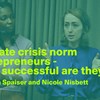transformerar

Climate Crisis Norm Entrepreneurs - How successful are they?
Recently, researchers have tried to identify various positive social tipping points that could help societies shift rapidly toward a sustainable, post-carbon future. One of the social tipping interven
Viktoria Spaiser and Nicole Nisbett: Climate Crisis Norm Entrepreneurs: How successful are they?
Place: At the Institute for Futures Studies, Holländargatan 13, Stockholm, or online. Research seminar with Viktoria Spaiser and Nicole Nisbett. REGISTERAbstractRecently, researchers have tried to identiJoin the seminar online or at the Institute for Futures Studies. If you will join on site, please check the box in the.
Allegiance Eroding: People’s Dwindling Willingness to Fight in Wars
in: The Civic Culture Transformed: from Allegiant to Assertive Citizens, Dalton, R & Welzel, C.,(eds), Page 261–281, Cambridge University Press, New York.
More Than a Revolving Door: Corporate lobbying and the socialization of institutional carriers
Organization Studies, https://doi.org/10.1177/0170840619848014 Abstract In this paper, I study an epitomic case of institutional carriers of ideas: revolving door lobbyists. In a multi-directional interv

The territory of democracy
The presumption that the jurisdiction of the state extends to the borderes of a certain territory is increasingly being challenged, both by indigenous people within this territory, and by extraterritoriral border control.
Postdoc scholarship at the Institute for Futures Studies in Stockholm
The Institute for Futures Studies and the Swedish Institute, is looking for a highly qualified postdoc to be part of an ambitious interdisciplinary research network, the World Values Survey, based in S
Karin Bäckstrand: The Role of Non-state Actors in Global Climate Governance after COP22 in Marrakech
Professor in Environmental Social Science, Stockholm University ABSTRACTWhat is the roles of non-state actors, such as civil society, business, indigenous movements and cities, in global climate and th Conference of the Parties (COP15) in Copenhagen to COP22 in Marrakech, where Marrakech Global Climate Action was launched involving voluntary climate action commitments from more than 12 000 companies, investors, cities and regions, and civil society actors. Over this timeframe, we have seen a form of ‘hybrid multilateralism’ emerge, in which UN climate diplomacy blurs state and non-state participation in complex and intriguing ways with implications for the authority, legitimacy, and effectiveness of climate governance. This speaks, in different ways, to the transformed landscape of climate cooperation with a strengthened interface of multilateral climate diplomacy and non-state climate action and the potential roles, modes, and effects of non-state actors in the post-Paris period.
Peter Edlund: Constructing an Arbiter of Status: A Study of the European Research Council's Emergence in the Field of Science
Peter Edlund, Researcher at the Department of Business Studies, Uppsala University. Abstract In my presentation, I will develop a theoretical account that centers on how certain actors are constructed i

Modern Vikings in the East. Sweden’s Role in 1990’s Russian Economic Reforms: Institutions, Elite Networks, and Informal Practices
What role did Swedish institutions, experts, and elites play in the economic and political development in post-Soviet Russia, with corruption, tax evasion and the emergence of the oligarchy as a result?
Talk about climate change so everyone listens!
In six months libraries and schools will once again be transformed into voting stations and the Swedish people will vote for the Sweden they want for the next four years. A question that has been on p








